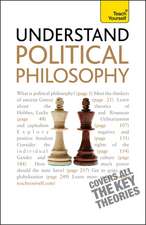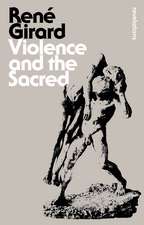The Poetics of Fear: A Human Response to Human Security
Autor Dr Chris Ericksonen Limba Engleză Paperback – 25 apr 2012
The Shield of Achilles from Homer's Iliad is used as metaphorical analysis to look at what the politics of fear is, how it works, and how it can be resisted. It aims to provide a human response to human security matters.
The work first shows how the Shield works to paralyze its audience. How can it be resisted? One response is to offer a warning about the hazards of bearing the Shield. After looking at thinkers such as Plato, Baudrillard, and Nietzsche, the work concludes with an examination of ekphrasis as a critical tool.
With a unique and fresh perspective, The Poetics of Fear will be relevant to those interested in security studies and critical theoretical approaches to political science.
| Toate formatele și edițiile | Preț | Express |
|---|---|---|
| Paperback (1) | 256.38 lei 6-8 săpt. | |
| Bloomsbury Publishing – 25 apr 2012 | 256.38 lei 6-8 săpt. | |
| Hardback (1) | 890.36 lei 6-8 săpt. | |
| Bloomsbury Publishing – 4 iul 2010 | 890.36 lei 6-8 săpt. |
Preț: 256.38 lei
Preț vechi: 330.59 lei
-22% Nou
Puncte Express: 385
Preț estimativ în valută:
49.06€ • 51.37$ • 40.69£
49.06€ • 51.37$ • 40.69£
Carte tipărită la comandă
Livrare economică 09-23 aprilie
Preluare comenzi: 021 569.72.76
Specificații
ISBN-13: 9781441155566
ISBN-10: 1441155562
Pagini: 232
Dimensiuni: 152 x 229 x 12 mm
Greutate: 0.31 kg
Editura: Bloomsbury Publishing
Colecția Continuum
Locul publicării:New York, United States
ISBN-10: 1441155562
Pagini: 232
Dimensiuni: 152 x 229 x 12 mm
Greutate: 0.31 kg
Editura: Bloomsbury Publishing
Colecția Continuum
Locul publicării:New York, United States
Caracteristici
Relevant and timely topic since questions of security continue to play a large role in both domestic and foreign politics.
Notă biografică
Dr. Erickson teaches political science at the University of British Columbia, Canada. His research focuses on contemporary political thought and critical theory, as well as radicalism in international politics, and contemporary security issues.
Cuprins
Chapter 1. Introduction: The Politics of Fear
Retracting the "Intractable"
Security, Speech Acts, and the Shield of Achilles
Summary: Plotting the Course
Chapter 2. The God of Fire's Gift: The Shield of Achilles and the Logic of Fear
The 30 Second Iliad
The Shield of Achilles
The Arms of Agamemnon
Beauty, Hope and Fear
Sarpedon's Body
The Shield in a Modern Context
Achilles and Priam: Setting Aside the Shield
Chapter 3. Unheeded Warnings
Sophocles
Ajax
Philoctetes
Thucydides: The Shield in Athenian Hands
Machiavelli: The Prince as Shield Bearer
Chapter 4. Mimesis as Resistance
Shields and Rings: Plato Against the Poets
Plato as a Poet
Plato as a Shield Bearer
Chapter 5. What Begins With Cratylus, Leads to Baudrillard
The Shield as Simulacrum
The Spirit of Terrorism
"Hyperrealist Abjection" or The Shield of Baudrillard
Perseus, Plato, Baudrillard
Chapter 6. Life as Literature: Politics as Poetics
Odysseus: Artfulness Above All Else
The Homeric Question
Nietzsche's Language
Nietzsche's View: From High Mountains
Chapter 7. Ekphrasis as Critique
From Perseus to Paris
Auerbach: The Insights of Comparative Mimesis
Krieger: The Still Mo(ve)ment of Ekphrasis
Mitchell: Ekphrastic Hope
Becker: Breaking the Illusion
Case Study: Obama as Shield Bearer
Chapter 8. Conclusion
APPENDIX A: President Bush's Address to a Joint Session of Congress, September 20, 2001
APPENDIX B: Remarks by the President on a New Strategy for Afghanistan and Pakistan, March 27, 2009
Bibliography
Retracting the "Intractable"
Security, Speech Acts, and the Shield of Achilles
Summary: Plotting the Course
Chapter 2. The God of Fire's Gift: The Shield of Achilles and the Logic of Fear
The 30 Second Iliad
The Shield of Achilles
The Arms of Agamemnon
Beauty, Hope and Fear
Sarpedon's Body
The Shield in a Modern Context
Achilles and Priam: Setting Aside the Shield
Chapter 3. Unheeded Warnings
Sophocles
Ajax
Philoctetes
Thucydides: The Shield in Athenian Hands
Machiavelli: The Prince as Shield Bearer
Chapter 4. Mimesis as Resistance
Shields and Rings: Plato Against the Poets
Plato as a Poet
Plato as a Shield Bearer
Chapter 5. What Begins With Cratylus, Leads to Baudrillard
The Shield as Simulacrum
The Spirit of Terrorism
"Hyperrealist Abjection" or The Shield of Baudrillard
Perseus, Plato, Baudrillard
Chapter 6. Life as Literature: Politics as Poetics
Odysseus: Artfulness Above All Else
The Homeric Question
Nietzsche's Language
Nietzsche's View: From High Mountains
Chapter 7. Ekphrasis as Critique
From Perseus to Paris
Auerbach: The Insights of Comparative Mimesis
Krieger: The Still Mo(ve)ment of Ekphrasis
Mitchell: Ekphrastic Hope
Becker: Breaking the Illusion
Case Study: Obama as Shield Bearer
Chapter 8. Conclusion
APPENDIX A: President Bush's Address to a Joint Session of Congress, September 20, 2001
APPENDIX B: Remarks by the President on a New Strategy for Afghanistan and Pakistan, March 27, 2009
Bibliography
Recenzii
"Subtlety of analysis and fearlessness in the face of complexity characterize Erickson's work: he reads poetically, seeing not just models for thought (and hence action), but also ways in which the very texts he reads complicate the matter. Erickson has a salutary awareness of metaphor, the reverberations of literary context, and the imaginative attitudes encouraged by various texts and methodologies. We rarely find in political thought such sensitivity to the deeper and more unsettling aspects of poetics, but here Erickson rejects the oversimplifications of 'realism' and shows how the cultural allies from the past that are enlisted on its side can themselves qualify, question, make problematic, or undermine the positions they are enlisted to support.This book compares favorably to the best of those that use Ancient Greek and Roman texts to think with and think through, in company with, e.g., the psychologist Jonathan Shay's Achilles in Vietnam: Combat Trauma and the Undoing of Character, or the legal scholar James Boyd White's Heracles' Bow: Essays in the Rhetoric and Poetics of the Law.In the end Erickson does come out with a clear position, but it is a position that is complex and flexible : we are often seduced by the simplicity of Realpolitik, but we can escape its unfit logic by resisting flattening and ham-fisted readings that use Classical texts to support political 'realism.' Erickson uses the ways in which the Shield of Achilles in the Iliad can encourage us to think of representation and mediation, in terms of a negotiated engagement with versions of the world. Erickson uses this as a springboard for careful interpretations not just of passages from the Iliad, but also Sophocles, Thucydides, Plato, Machiavelli, Nietzsche, Derrida, and Baudrillard, culminating in the use the Homeric Shield of Achilles to shape an analysis of a pair of speeches, one by George W. Bush, one by Barack Obama.Such intellectually fruitful use of poetics to understand politics is as impressive as it is rare." --Dr. Andrew S. Becker, Associate Professor of Latin & Ancient Greek Languages, Literatures, & Cultures and Co-Director, Spring Semester Liberal Arts Program, Center for European Studies & Architecture, Riva San Vitale, Switzerland
This book will be of interest and use to those students and researchers of international affairs, who have recognised the importance of affects and emotions in foreign politics. It will also benefit those scholars, who are interested in developing more sophisticate interdisciplinary approaches to IR by bringing together the study of world politics and the theoretical humanities.
This book will be of interest and use to those students and researchers of international affairs, who have recognised the importance of affects and emotions in foreign politics. It will also benefit those scholars, who are interested in developing more sophisticate interdisciplinary approaches to IR by bringing together the study of world politics and the theoretical humanities.

















